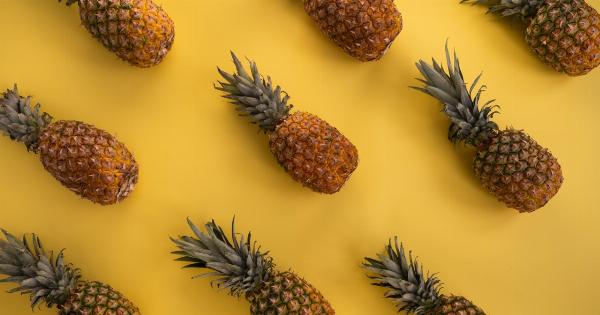Collagen is a protein that plays a vital role in maintaining the health and elasticity of our skin, hair, nails, and joints.
As we age, the production of collagen in our bodies begins to decline, leading to the development of wrinkles, sagging skin, and brittle nails. While there are numerous skincare products and treatments available to help boost collagen levels externally, it is equally important to focus on our diet to enhance collagen production internally.
While some foods can promote collagen production, there are also several foods that can have a negative impact on collagen levels.
In this article, we will explore the anti-collagen diet and highlight 30 foods that you should avoid to maintain youthful and healthy skin.
1. Sugar
Sugar is one of the biggest culprits when it comes to damaging collagen. Consuming excess sugar leads to a process called glycation, where sugar molecules attach themselves to collagen fibers, making them weak and less elastic.
This process accelerates the aging of the skin, resulting in wrinkles and loss of firmness.
2. Processed Meats
Foods like sausages, hot dogs, bacon, and other processed meats are high in advanced glycation end products (AGEs). These AGEs can compromise collagen integrity and contribute to premature aging of the skin.
3. Alcohol
Alcohol dehydrates the body and reduces collagen production. Excessive alcohol consumption can lead to inflammation, damage to collagen fibers, and hinder the body’s natural ability to repair and produce new collagen.
4. Fried Foods
Fried foods are typically cooked in oils that contain high levels of trans fats, which promote inflammation and can lead to the breakdown of collagen fibers. Regular consumption of fried foods can contribute to the aging process and skin damage.
5. Soda
Carbonated beverages, especially soda, contain high amounts of sugar and artificial additives.
These can trigger glycation processes and negatively impact collagen levels, ultimately leading to skin aging and other detrimental effects on your overall health.
6. High-Sodium Foods
Consuming foods that are high in sodium can dehydrate the body, leading to dry and dull-looking skin. Additionally, excessive sodium intake promotes water retention, which can cause puffiness and swelling, further affecting collagen density.
7. Refined Grains
Refined grains like white bread, pasta, and rice lack essential nutrients and fiber. These foods have a high glycemic index, which means they can rapidly increase blood sugar levels, negatively impacting collagen production.
8. Artificial Sweeteners
Artificial sweeteners, commonly found in diet sodas and sugar-free snacks, can trigger a similar glycation process like regular sugar. These sweeteners can also disrupt the gut microbiome, which plays a crucial role in collagen synthesis.
9. Caffeine
While moderate caffeine consumption is generally considered safe, excessive intake can dehydrate the body and lead to the breakdown of collagen fibers.
Make sure to balance your caffeine intake with ample hydration to minimize its potential negative effects.
10. Margarine and Hydrogenated Oils
Margarine and hydrogenated oils often contain trans fats, which contribute to inflammation and can damage collagen. These unhealthy fats are commonly found in baked goods, fried foods, and processed snacks.
11. Excessive Salt
Consuming excessive salt can contribute to fluid retention, which can increase puffiness and negatively impact collagen levels. Be mindful of your salt intake and opt for natural seasonings and herbs to flavor your meals instead.
12. Artificial Food Additives
Artificial food additives, such as artificial colors, flavors, and preservatives, can trigger inflammation and free radical damage, leading to collagen breakdown. These additives are often found in packaged and processed foods.
13. High-Fructose Corn Syrup
High-fructose corn syrup is a highly processed sweetener that is widely used in many processed foods and beverages. Like regular sugar, it can promote glycation, negatively affecting collagen levels and contributing to skin aging.
14. Dairy Products
While dairy products can be a good source of calcium and protein, some individuals may experience inflammation or allergic reactions to dairy, which can affect collagen production and result in skin issues.
15. Trans Fats
Trans fats, commonly found in fried foods, pastries, and commercially baked goods, contribute to inflammation and can damage collagen. Avoiding foods high in trans fats is crucial for supporting collagen health.
16. High-Fat Foods
Consuming excessive amounts of high-fat foods can result in weight gain and inflammation, both of which can negatively impact collagen production and skin health. Opt for healthier fats, such as avocados and nuts, in moderation.
17. Artificial Trans Fats
Artificial trans fats, often listed as “partially hydrogenated oils” on ingredient lists, are highly damaging to collagen. These fats are often found in processed snacks, fried foods, and margarine.
18. Fast Food
Fast food is typically high in unhealthy fats, salt, and processed ingredients that can trigger inflammation and damage collagen fibers. Regular consumption of fast food can accelerate the aging process and hinder collagen production.
19. High-Mercury Fish
Fish that are high in mercury, such as shark, swordfish, and king mackerel, can impair collagen synthesis.
Opt for lower-mercury alternatives like salmon, trout, and sardines to ensure you’re getting the skin-boosting benefits of omega-3 fatty acids without the risk of mercury toxicity.
20. Artificial Flavors
Artificial flavors often contain chemical additives that can trigger inflammation and negatively impact collagen levels. These flavors are commonly found in processed snacks, desserts, and beverages.
21. High-Caffeine Energy Drinks
Energy drinks often contain high amounts of caffeine, sugar, and artificial additives. The combination of excessive caffeine and sugar can lead to inflammation and hinder collagen production.
Opt for natural sources of energy, such as green tea or fresh fruits.
22. Margarine
Margarine is often made from hydrogenated oils, which can contain trans fats. Trans fats can trigger inflammation, damage collagen, and contribute to skin aging. It is best to avoid or limit the consumption of margarine.
23. Charred Meats
Cooking meats at high temperatures can create compounds called heterocyclic amines (HCAs) and polycyclic aromatic hydrocarbons (PAHs), which are linked to inflammation and collagen damage.
Opt for gentler cooking methods like baking, steaming, or grilling at lower temperatures.
24. High-Glycemic Fruits
While fruits are generally healthy, some fruits, like pineapples and melons, have a higher glycemic index and can cause a rapid spike in blood sugar levels. Consuming these fruits in moderation is recommended to maintain healthy collagen levels.
25. High-Glycemic Vegetables
Similar to high-glycemic fruits, certain vegetables, such as white potatoes and corn, can also have a significant impact on blood sugar levels.
Limiting consumption or opting for low-glycemic alternatives like sweet potatoes and cauliflower can help support collagen health.
26. Non-Organic Produce
Conventionally grown fruits and vegetables are often exposed to pesticides and chemicals that can have a negative impact on collagen production. Whenever possible, opt for organic produce to reduce exposure to these potentially harmful substances.
27. High-Gluten Foods
Gluten, a protein commonly found in wheat and other grains, can trigger inflammation and gut-related issues. These can potentially affect collagen synthesis.
If you suspect gluten sensitivity, consider exploring gluten-free alternatives and consulting with a healthcare professional.
28. Excessive Red Meat
While red meat can be a good source of protein, consuming it in excess can lead to inflammation, which can negatively impact collagen production. Aim for a balanced diet that includes a variety of protein sources.
29. Artificial Preservatives
Artificial preservatives, such as BHA (butylated hydroxyanisole), BHT (butylated hydroxytoluene), and TBHQ (tert-butylhydroquinone), can trigger inflammation and have been shown to interfere with collagen synthesis.
These preservatives are commonly found in processed foods.
30. High-Omega-6 Vegetable Oils
Inflammatory omega-6 fatty acids are commonly found in vegetable oils like soybean oil, corn oil, and sunflower oil. A diet high in these oils can promote inflammation and hinder collagen production.
Opt for healthier alternatives like olive oil or avocado oil.
Conclusion
Paying attention to your diet and avoiding collagen-damaging foods is just as important as using skincare products to maintain healthy collagen levels and promote youthful skin.
By avoiding or minimizing the consumption of these 30 foods, you can support collagen production and delay the signs of aging. Remember, a well-rounded diet rich in whole foods, lean proteins, antioxidants, and healthy fats is key to supporting optimal collagen health.































